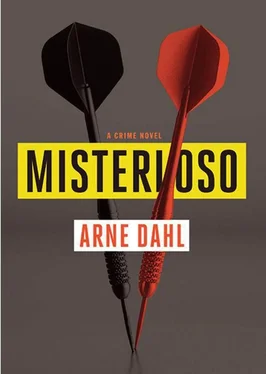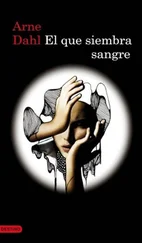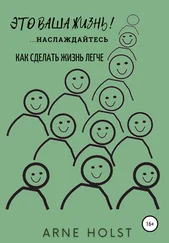Hjelm emerged into suddenly radiant spring sunshine, lugging a big box filled with guest books. There wasn’t a trace of wind. Perfect golf weather, or so he assumed.
The only indication that he’d arrived at the right place was a yellowing old label, handwritten and partially torn away, next to one of the buttons. “Mimiro,” it said. There were nine other buttons in the low entryway, half a flight of stairs down, on Stallgränd in Gamla Stan. He pressed the button. Through a rusty little grating on the building intercom, a stentorian voice bellowed, “Yes?”
“I’m not sure that I’m in the right place. I’m looking for the organization called the Order of Mimir.”
“This is the Order of Mimir. What can I do for you?”
“I’m from the Criminal Police. It has to do with a couple of your members.”
“Come in.”
The lock buzzed, and Hjelm pushed open the worn door. It was so low that he had to stoop to enter. The hall was narrow and dingy, the air dusty and damp. It was a medieval building that looked as if it had never been remodeled. He paused for a moment to allow his eyes to adjust to the dark.
In a doorway appeared a tall, sinewy old man wrapped in a strange, lavender-colored cloak. He held out his hand toward Hjelm. If he hadn’t studied up on the nature of these organizations, he probably would have tried to twist the man’s arm out of its socket and at the same time avoid baring his throat.
“How do you do?” said the man, whose voice was no more of this world than he himself seemed to be. “I’m David Clöfwenhielm, Guardian of the Order of Mimir.”
“Paul Hjelm.” As Hjelm expected, the man had a firm handshake, though not exactly like the Freemasons, if a comparison were permitted.
“You haven’t yet seen the inner sanctum.” The words resonated from David Clöfwenhielm’s golden throat. “And you may never see it. How close you come depends on the reason why you’re here.”
“Guardian,” said Hjelm. “Is that something like a Grand Master?”
“We don’t use that sort of outmoded title. We don’t want our order to risk being considered a lesser variant of the Freemasons. By the way, do you happen to know who the Grand Master of the Freemasons is here in Sweden?”
Hjelm shook his head.
“Prince Bertil,” said Clöfwenhielm.
“Is he still alive?” said Hjelm.
Clöfwenhielm emitted a thunderous sound, and only after it had echoed ten times was it possible to identify it as a laugh. Apparently there was some animosity between the two organizations. “Come in, inspector.”
“Thank you,” said Hjelm with no intention of correcting him as to his proper title. Any sort of promotion was undoubtedly useful in this situation.
They slowly descended a long, winding staircase. The massive stone walls were dripping with moisture, and the ceiling was so low that the lanky Clöfwenhielm bent nearly double as he led the way. Here and there a damp-resistant torch was affixed to the wall. Finally they entered a small room with several coats of arms scattered over the walls, thick velvety drapery on the far wall, and an enormous oak desk. On the desk stood two plastic cheese bells; rivulets of moisture formed and dripped off the outside of the misty, opaque surfaces. Clöfwenhielm lifted up one of the cheese bells and took out a small, ultramodern laptop, a miracle of an anachronism. He sat down at the desk.
“I assume that you want to consult our directory for some reason,” he rumbled. His voice, which had seemed so out of place upstairs in the relative light, was now in its proper element. “Please have a seat, superintendent.”
At this rate I’ll be the chief of police in another fifteen minutes , thought Hjelm as he took a small chair facing the Guardian.
“Your assumption is quite correct, Guardian,” he said in an ingratiating tone. “It has to do with two of your members. Both have been murdered within the past few days.”
Clöfwenhielm didn’t look especially shocked, although perhaps a bit wary. He straightened the collar of his lavender cloak.
“The brothers of the Order of Mimir usually hold positions in society where acts of violence are extremely rare. Are you insinuating that it had something to do with the Order of Mimir?”
“Not at all. We’re looking into every possible connection between the two victims, and our primary concern at the moment is to prevent another murder. The fact that they were both members of this organization is one of these connections.”
“I understand. So what is this about?”
“You don’t read the newspapers, Guardian?”
“Very seldom anymore,” said Clöfwenhielm. “Having decided to devote myself to the organization, I retired not only from my job but also from those parts of the outside world that I find repulsive. That’s permissible when you reach a certain age.”
“And a certain financial status.”
“Of course,” said Clöfwenhielm, his tone neutral.
“How many members does the Order of Mimir have?”
“Sixty-three,” and he said, “all very carefully chosen. Well, sixty-one, now,” he corrected himself.
“Of course,” said Hjelm, his tone equally neutral. “Do you know all of them personally?”
“What goes on within the order has very little to do with anything personal. We are preoccupied with what is above and beyond the personal. And besides, during the rituals we usually wear cloaks, rather like the one I’m wearing now, and masks of various types representing the Nordic gods. I seldom see anyone’s face. But now we’re touching on proprietary information.”
“Top, top secret.”
“Precisely,” said Clöfwenhielm, without for a second questioning the odd choice of words.
“There’s one thing I’m curious about,” said Hjelm. “Can you explain to someone who’s a complete outsider what makes these kinds of organizations so attractive to certain groups in society?”
“I could give you an idealistic answer and say that we’re united by a desire to expand our consciousness, to open pathways into the unexplored parts of our souls. But that wouldn’t be entirely in keeping with the truth. Many by-products of the world I’ve left behind follow the brothers here from the outside: prestige, the feeling of being one of the chosen, an attitude of superiority, the desire to make connections, freedom from women, and an often artificial sense of tradition.
“The Order of Mimir can be traced back to Geijer’s Gothicism of the early 1800s, which marked a resurgence of interest in Nordic mythology. But ninety percent of the members have no clue about this. If I required of the brothers the same purity and enthusiasm that I expect of myself, I would be sitting here chanting all alone. And that might not be such a bad idea.” Clöfwenhielm sighed a bit before returning to his usual thunderous tone of voice. “All right, so what are the names of the two departed brothers?”
“Kuno Daggfeldt and Bernhard Strand-Julén.”
The Guardian of the Order of Mimir let his fingers wander over the computer keyboard. “I see,” he said hesitantly. “Once again we have taken a small step across the magical border into secrecy.”
“Do you mean that we’re touching on confidential matters?”
“We’re bordering on that, in any case. Allow me to think for a moment.”
David Clöfwenhielm was allowed time to think.
“All right,” he said at last. “Assisting the authorities in a murder investigation concerning two of our brothers must be given priority. Come over here, Hjelm.”
Hjelm looked at the screen over Clöfwenhielm’s shoulder.
“As you can see, I’m scrolling through the names relatively quickly so that you won’t be tempted to memorize too many of them. Sometimes you’ll notice an asterisk flashing past in front of a name. There’s one in front of both the ones you mentioned. Here we have Daggfeldt, and here’s Strand-Julén. An asterisk next to each. There are ten of them altogether. You can sit down again, Hjelm.”
Читать дальше











